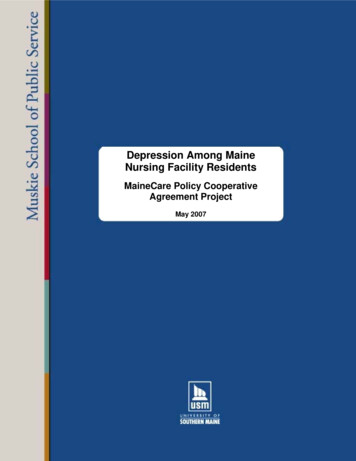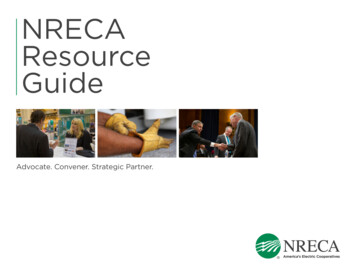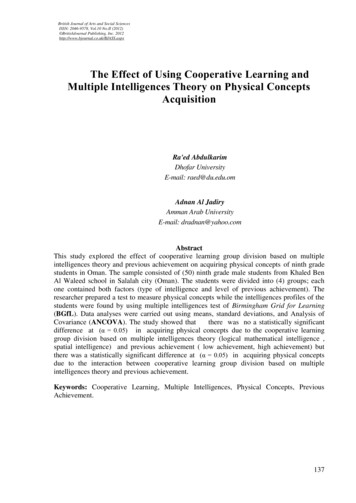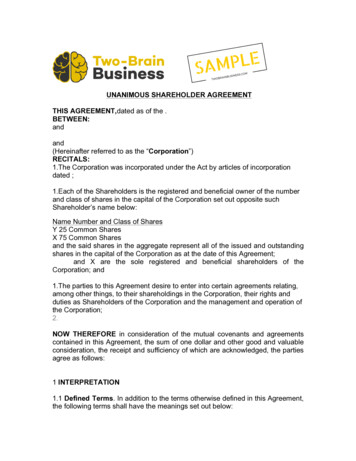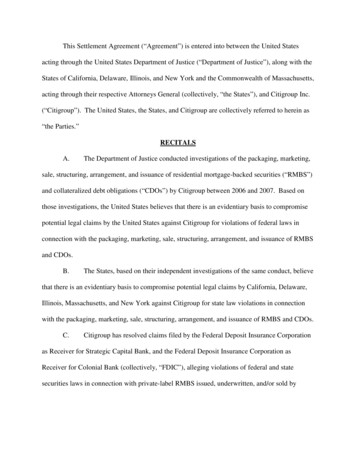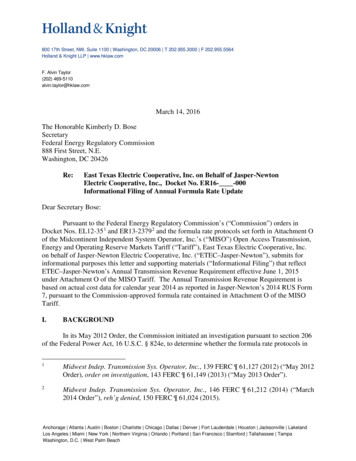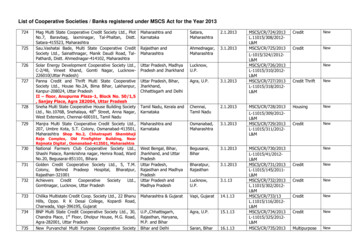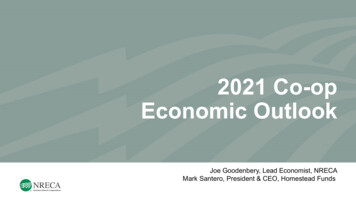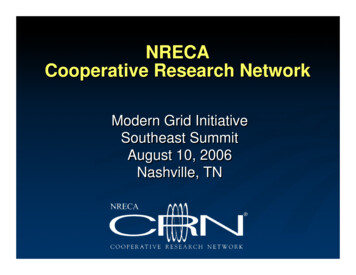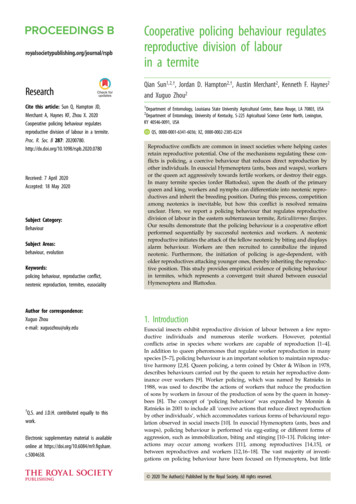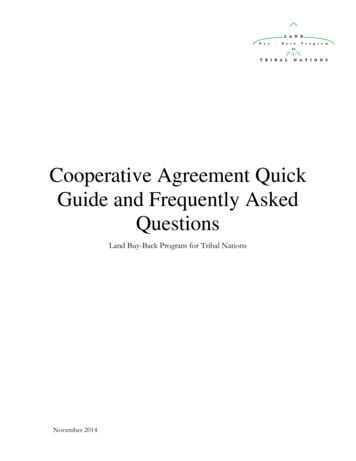
Transcription
Cooperative Agreement QuickGuide and Frequently AskedQuestionsLand Buy-Back Program for Tribal NationsNovember 2014
Land Buy-Back Program for Tribal NationsCooperative Agreement GuideIntroductionThe Department of the Interior (DOI or the Department) is interested in partnering with tribes to gain their directparticipation in the Land Buy-Back Program for Tribal Nations (Buy-Back Program or Program) to improve theoverall effectiveness of the Program on their reservations. One of the ways the Program plans to accomplish this isby utilizing cooperative agreements.A cooperative agreement is a type of financial assistance award similar to a grant. It is a legal instrumentrepresenting the relationship between the Federal Government (i.e., the Buy-Back Program) and a recipient (i.e., atribe). Its principle purpose is to transfer a thing of value (primarily funding in this case) to a recipient to carry out apublic purpose of support or stimulation, as authorized by the Federal Government. 1 When completing theactivities under a cooperative agreement, substantial involvement is expected between the parties.Unlike a grant, a cooperative agreement entails “substantial involvement” on the part of the Department during the awardperiod. Examples of “substantial involvement” from DOI may include participation and collaboration with the tribe incarrying out the Application Narrative, reviews / approvals of one stage of work before the next can begin, and / or assistancewith selection of project staff. 2It is important to note that a cooperative agreement is not necessary for a tribe to partner with the Buy-BackProgram to complete land consolidation activities. For example, a cooperative agreement would not be necessaryfor a tribe that is not seeking funding for activities in support of land consolidation on its reservation. If a tribe isunsure of whether to apply for a cooperative agreement, it should contact the Buy-Back Program.The Cooperative Agreement Application PackageTo enter into a cooperative agreement with the Buy-Back Program, a tribe must submit an application. A tribe’scooperative agreement application package must include all of the following documents to be considered forfunding: Scope of Work Checklist 3Application Narrative 4The following SF-424 Application Forms: SF-424 Application for Federal Assistance SF-424(A) Budget Information for Non-Construction Programs SF-424(B) Assurances for Non-Construction ProgramsTribal AuthorizationTribal Priority Tract ListingSections I through V of this guide provide an overview of each of these documents; however, please refer to theCooperative Agreement Application Instructions for more information on these documents and how to prepare anapplication. The Buy-Back Program staff is also available to assist and answer questions.1234505 Departmental Manual (DM) 2, Section 2.9 at B(1).505 DM 2, Section 2.9 at B(3)(a).Formerly known as the “Scope of Work Template”Formerly known as the “Statement of Work”Page 1 of 11
Land Buy-Back Program for Tribal NationsCooperative Agreement GuideI.Scope of Work ChecklistThe Scope of Work Checklist is a high-level checklist form that a tribe will complete as part of its application. Itdescribes the three phases of the Buy-Back Program’s land consolidation process (outreach, land research, andvaluation), as well as eight phase-specific tasks (such as pre-offer outreach) that a tribe may elect to perform througha cooperative agreement 5. The tribe will “check off” the phase-specific tasks it would like to perform. Tribes willonly “check off” those tasks they are willing and able to perform. The Program will take responsibility for tasks leftunchecked in the Checklist.Tribes should complete the Scope of Work Checklist following initial discussions with the Buy-Back Program.II.Application NarrativeThe Application Narrative is a comprehensive and detailed document in which a tribe describes how it proposes toperform and meet the requirements of the tasks it proposes to undertake in the Scope of Work Checklist. Similar toa grant proposal, the Application Narrative is the document where a tribe provides detailed narrative, timeframe,and budgetary information on the anticipated activities and associated costs under a cooperative agreement with theBuy-Back Program. While the Scope of Work Checklist identifies what activities the tribe proposes to perform, theApplication Narrative is where the tribe describes how the tribe proposes to perform them.Please see the Cooperative Agreement Application Instructions for additional information on preparing asatisfactory Application Narrative.III.Standard Application FormsIn addition to the Scope of Work Checklist and the Application Narrative, tribes must also complete and submit thefollowing three standard, government-wide required federal financial assistance application forms as part of theircooperative agreement application packages: IV.SF-424 Application for Federal AssistanceSF-424A Budget Information for Non-Construction ProgramsSF-424B Assurances for Non-Construction ProgramsTribal AuthorizationThe cooperative agreement application package must be accompanied by a tribal authorization approving the tribe’sparticipation in the Buy-Back Program. While many tribes utilize tribal resolutions to conduct official business, notall tribes employ this format. Therefore, the tribal authorization should take the form of whatever means by whichtribal business is conducted.Please see the Tribal Authorization Guidance and Sample Language document for additional information, includingsample authorization language.V.Tribal Priority Tract Listing5A fourth land consolidation phase, the Acquisition Phase, will be completed by the Buy-Back Program. The Acquisition Phase consists ofmailing offer packets to owners, receiving and processing completed offers and posting payments to Individual Indian Money accounts.Page 2 of 11
Land Buy-Back Program for Tribal NationsCooperative Agreement GuideTribes must provide the Buy-Back Program with a listing of those fractional interests within their reservations thatare priorities for potential purchase so that the Program can attempt to purchase them, to the extent feasible. Aspart of the application preparation process, the Buy-Back Program can provide data and other information to thetribe to help in the development of its priority tract listing. The tribe may submit a draft list with the cooperativeagreement application. However, in those cases, it is important to identify the submitted listing as a draft. A finaltribal priority tract listing will be required after the cooperative agreement is awarded.Awarding of the Cooperative AgreementTo award a cooperative agreement to a tribe, the Program completes the Cooperative Agreement Template withinformation from the tribe’s submitted application package. The purpose of this award document is to provide thelegal instrument through which funding can be provided to a tribe to carry out the agreed upon Program activities.An authorized tribal official must sign the Cooperative Agreement Template to acknowledge that the tribeunderstands the terms and conditions of the agreement. Upon signature, the tribe must return the signed agreementto the Buy-Back Program so that it can obligate the funds. A copy of the final award documents, including thesigned and obligated cooperative agreement, will be sent to the tribal point of contact after obligation.Page 3 of 11
Land Buy-Back Program for Tribal NationsCooperative Agreement GuideFrequently Asked QuestionsI.General How will the Department consider tribes’ application packages for cooperative agreements? Can my tribe apply for a cooperative agreement? II.Can my tribe use a Self-Determination contract (i.e. the Public Law (P.L.) 93-638) or a Self-Governancecompact instead of a cooperative agreement for Program activities?Can my tribe work with other tribes to implement the Buy-Back Program?What is the estimated timeframe for my tribe’s cooperative agreement (i.e., how long will the Programoperate on my reservation)?Activities What are some typical activities that my tribe may perform under a cooperative agreement? Are there activities that my tribe cannot perform under a cooperative agreement? What support will the Program provide to my tribe during the land consolidation phases? Can my tribe obtain outside assistance for the responsibilities outlined in the Scope of Work Checklist? What will the Program monitor after a cooperative agreement is in place?III.Funding How much funding can my tribe request in its cooperative agreement application? After the Department approves my tribe’s cooperative agreement, when and how will we receive funding? Is my tribe able to immediately receive a portion of the administrative funding and invest it in an interestbearing account? What portion of the Trust Land Consolidation Fund will be used to fund my tribe’s cooperative agreement? Can my tribe request additional funding after a cooperative agreement has been awarded? Can my tribe request indirect costs as a part of its cooperative agreement application? Can my tribe be reimbursed for costs incurred prior to the award of the cooperative agreement?IV.Miscellaneous If my tribe fails to fulfill its responsibilities under its cooperative agreement, what are the consequences?Page 4 of 11
Land Buy-Back Program for Tribal NationsCooperative Agreement Guide Can my tribe hire full-time staff to carry out aspects of the Program?If my tribe procures supplies and equipment with cooperative agreement funds to assist with Programimplementation, who owns the items once the cooperative agreement ends?Who can I contact for more information?Page 5 of 11
Land Buy-Back Program for Tribal NationsCooperative Agreement GuideI.General1. How will the Department consider tribes’ application packages for cooperative agreements?The Department uses several criteria to consider proposed cooperative agreements. These criteria mayinclude: Completeness of the application package;The tribe’s capacity to perform the tasks and meet the task-specific requirements outlined in theScope of Work Checklist; andThe tribe’s proposed budget(s).2. Can my tribe apply for a cooperative agreement?Tribes should review and familiarize themselves with the cooperative agreement application documents andare encouraged to contact Buy-Back Program staff to discuss the documents before preparing or submittingan application.It is important to note that a tribe is not required to enter into a cooperative agreement to participate in theBuy-Back Program. In certain cases, it may be unnecessary. If a tribe is unsure of whether or not to applyfor a cooperative agreement, it should contact the Buy-Back Program to discuss the tribe’s specific needs.3. Can my tribe use a Self-Determination contract or a Self-Governance compact (i.e., agreementsexecuted under Public Law (P.L.) 93-638) instead of a cooperative agreement for Programactivities?No, the Indian Land Consolidation Act (ILCA) authorizes the Department to enter into agreements withtribal governments to carry out Program activities; however, the provisions of the Indian SelfDetermination and Education Assistance Act do not apply to these agreements. 64. Can my tribe work with other tribes to implement the Buy-Back Program?Yes, the Program will consider cooperative agreement applications from tribes seeking to work together toimplement the Buy-Back Program; however, only one tribe can receive the cooperative agreement (i.e., canbe listed on the cooperative agreement as the recipient). Tribes should detail planned tribal collaboration inthe application package, to include the goals, risks, and benefits of such cooperation. An individual tribemay apply for and enter into a cooperative agreement with the Program, and that tribe can sub-award toother tribes, who then become sub-recipients under the agreement.5. What is the estimated timeframe for my tribe’s cooperative agreement (i.e., how long will theProgram operate on my reservation)?Agreement lengths will vary and depend on the unique needs of each reservation. In general, cooperativeagreements awards will be made for a period of approximately twelve months, however, some awards maybe for a longer period. The Department will work with the tribe to determine an appropriate timeframe625 USC 2212, at (b)(3)(C).Page 6 of 11
Land Buy-Back Program for Tribal NationsCooperative Agreement Guidebased on its individual needs as part of the cooperative agreement award process. Some cooperativeagreement awards may be extended based on the outcomes of the initial period of performance.II.Activities1. What are some potential activities that my tribe may perform under a cooperative agreement?The Buy-Back Program divides the land consolidation process into four phases which are described in theNovember 20, 2014 Status Report and summarized below: Outreach refers to the process of communicating with landowners regarding the potentialopportunity to sell their fractional interests and to address their questions and concerns. Outreachalso includes planning, information sharing, and consultation with tribes.Land research includes the development of mapping, land use, and other data necessary toestablish fair market value for the tracts containing fractional interests.Valuation is the process of appraising fractionated tracts to determine their fair market value.Acquisition is the process of extending offers to landowners in an effort to acquire interests fromthose interested in selling.While the acquisition phase will be primarily carried out by the Buy-Back Program, there are eight phasespecific tasks that tribes may perform under a cooperative agreement among the three other phases;outreach, land research and valuation. These tasks are detailed in the Scope of Work Checklist. Tribes areencouraged to work with the Program to determine which activities they could undertake throughcooperative agreements with the Department.2. Are there activities that my tribe cannot perform under a cooperative agreement?The acquisition phase will be carried out predominantly by the Buy-Back Program via a highly automatedprocess. However, tribe’s performing pre-offer and post-offer outreach will be directly supporting theseacquisition efforts.3. What support will the Program provide to my tribe during the land consolidation phases?The Program will provide support by sharing materials across reservations and leveraging lessons learnedfrom previous Buy-Back Program locations. For example, the Program may distribute outreach materials(e.g., brochures, handouts, and presentations) that a tribe can modify for implementation of the Program atits reservation. In addition, the Buy-Back Program will provide technical support to tribes by designating apoint of contact to answer questions or field suggestions that the tribe may have during the timeframe theBuy-Back Program is active at that location.4. Can my tribe obtain outside assistance for the responsibilities outlined in the Scope of WorkChecklist?Yes, a tribe may use an outside contractor to perform activities funded by a cooperative agreement. Allproposed costs, including contractor costs, should be detailed in the tribe’s application package. Tribalprocurement procedures must comply with applicable procurement regulations governing the cooperativeagreement (43 C.F.R. § 12.76).Page 7 of 11
Land Buy-Back Program for Tribal NationsCooperative Agreement Guide5. What will the Program monitor after a cooperative agreement is in place?It is the Department’s policy to ensure the fiscal and programmatic integrity of all its financial assistanceprograms through proactive monitoring. The Program will monitor awarded cooperative agreements toensure that tribes carry out funded activities in a manner consistent with the award terms and conditions.To assist the Department in fulfilling its monitoring responsibilities, tribal recipients of cooperativeagreements must comply with financial and performance reporting requirements as detailed in theagreement terms and conditions. These requirements will include the submission of quarterly financial andperformance reports. Tribes must use the SF-425 Federal Financial Report for financial reporting. Althoughthere is no standard format for performance reports, at the minimum, the reports must include thefollowing: A description of whether objectives were met for the period, including a cost breakdown;An explanation for any unmet objectives; andAdditional information as needed (e.g., analysis of cost overruns).Final financial and performance reports must be submitted within 90 calendar days of the end of thecooperative agreement. The tribe may also be responsible for providing other reports and related data to theProgram upon request or as specified in the cooperative agreement.III.Funding1. How much funding can my tribe request in its cooperative agreement application?The Cobell Settlement limits the amount of funding that may be used for administrative expenses in orderto maximize the amount available for purchasing fractional interests. Consequently, cost-efficiency is animportant consideration for the Program when entering into cooperative agreements with tribes. Whilethere is no minimum or maximum request amount, most individual cooperative agreement awards are notexpected to exceed 500,000.2. After the Department approves my tribe’s cooperative agreement, when and how will we receivefunding?Tribal recipients of cooperative agreements must use the U.S. Department of Treasury's AutomatedStandard Application for Payments (ASAP) system to request funds. Unless a tribe is already enrolled inASAP under the Office of the Secretary’s Agency Locator Code (14010001), the tribe must enroll regardlessof whether it is already using ASAP for other funding agreements, such as Bureau of Indian Affairs (BIA)agreements. Once a tribe has submitted its ASAP enrollment forms to the Department (which will beprovided to the tribe by the Program) and the Buy-Back Program has initiated system enrollment, the ASAPsystem will electronically contact the tribe with information on the steps required to complete theenrollment process.After the cooperative agreement is obligated, a tribe may request advance payments via ASAP on an asneeded basis, however, advance payment requests should be limited to the amount needed and timed inaccordance with tribe’s immediate cash requirements pursuant to the applicable regulations (43 C.F.R §12.61).Page 8 of 11
Land Buy-Back Program for Tribal NationsCooperative Agreement GuideAll costs to be charged by tribes against the cooperative agreements must be allowable, reasonable, allocableand in accordance with the approved cooperative agreement budget. Tribes may not use Program funds forany other activities, including activities related to Self-Determination contracts or Self-Governancecompacts.3. Is my tribe able to immediately receive a portion of the administrative funding and invest it in aninterest-bearing account?Neither the Cobell Settlement Agreement nor the Claims Resolution Act of 2010 express authority to investportions of the Trust Land Consolidation Fund (Fund). Funds awarded through a cooperative agreementwill be partially advanced or fully reimbursed, as deemed appropriate, to the tribe via ASAP. The applicableregulations (43 C.F.R. § 12.61) require that recipients minimize the time elapsing between receipt of thefunds and their disbursement, thus investment of awarded funds would not be practical. In addition,pursuant to 43 C.F.R. §12.61, interest earned on advanced funds in excess of 100 must be remitted to theFederal awarding agency.4. What portion of the Trust Land Consolidation Fund will be used to fund my tribe’s cooperativeagreement?The Cobell Settlement Agreement limits the amount that may be expended on administrative costs forimplementing the
Nov 20, 2014 · A cooperative agreement is a type of financial assistance award similar to a grant. It is a legal instrument representing the relationship between the Federal Government (i.e., the Buy-Back Program) and a recipient (i.e., a tribe). Its principle purpose is to transfer a thing of value (prim
